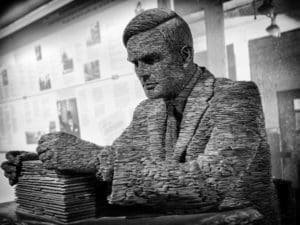 The life of Alan Turing —the man who broke the Nazi Enigma code in World War II, providing the intelligence that led the Allies to victory—is one of many wrenching stories to be remembered during Pride Month, the annual remembrance and celebration of the fight for LGBT rights.
The life of Alan Turing —the man who broke the Nazi Enigma code in World War II, providing the intelligence that led the Allies to victory—is one of many wrenching stories to be remembered during Pride Month, the annual remembrance and celebration of the fight for LGBT rights.
Born June 23, 1912, Turing “left a remarkable national legacy through his substantial scientific achievements, often being referred to as the ‘father of modern computing,’” in the words of former British Prime Minister David Cameron; Turing’s “action saved countless lives.”
The heroic efforts of Alan Turing
In addition to breaking the Enigma code, Turing also consulted on the encryption of conversations between Winston Churchill and Franklin D. Roosevelt. For his wartime efforts, Turing was named an Officer of the Most Excellent Order of the British Empire, one of his country’s highest civilian honors. He also devised the Turing Test, a measure of artificial intelligence.
But in 1952, Turning was arrested and convicted under Victorian-era laws prohibiting homosexuality. Turing didn’t deny his sexual orientation. He endured the punishment on the books: a chemical castration, which entailed a series of estrogen injections that left him impotent and caused gynecomastia.
Initially, Turing continued his work in the computer lab, openly mocking his punishment and traveling to European countries where gay men were slowly being more accepted. But his conviction also meant he lost his security clearance, thus shutting him out of Britain’s Cold War intelligence gathering.
On June 7, 1954, Turing was found dead next to a half-eaten apple laced with cyanide. Most biographers believe he took his own life, though his mother challenged the conclusion.
In 2009, Prime Minister Gordon Brown issued a formal apology to the mathematician, but it wasn’t until 2013 that Queen Elizabeth II formally pardoned Turing. The laws under which he was convicted were overturned in 1967.
Photo: Lenscap Photography / Shutterstock
